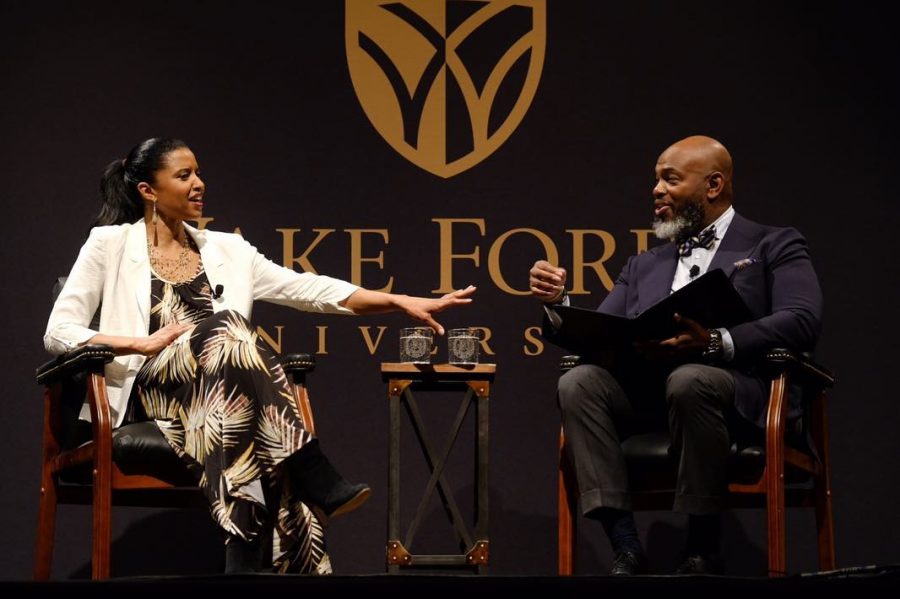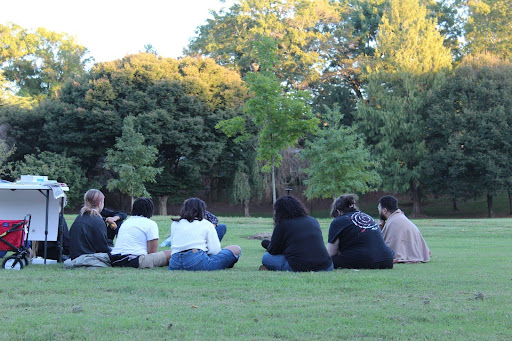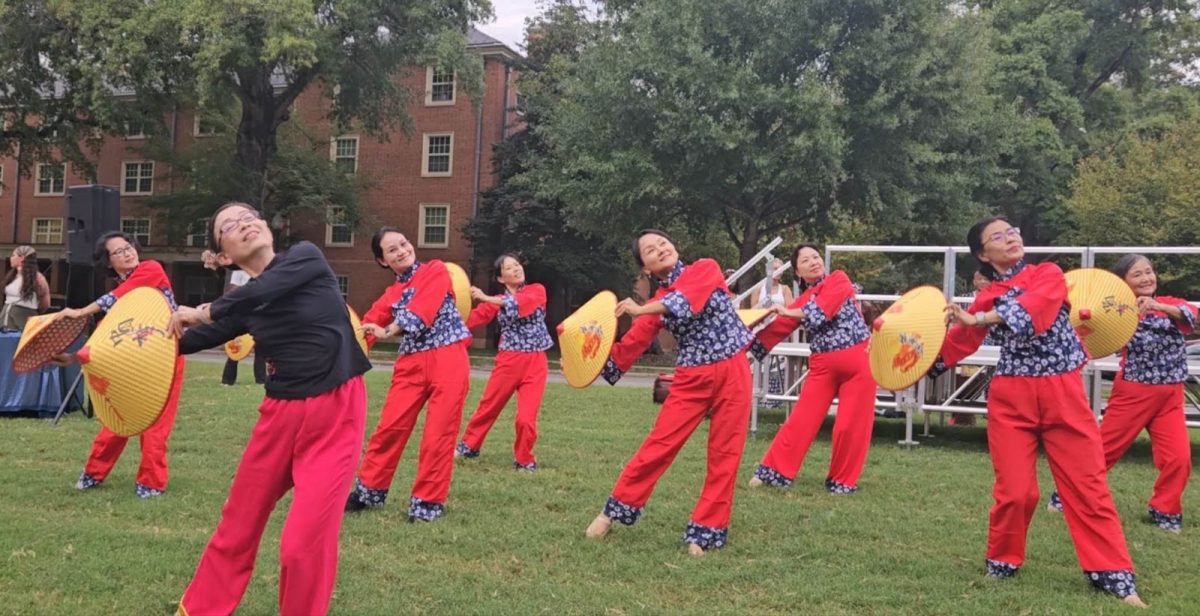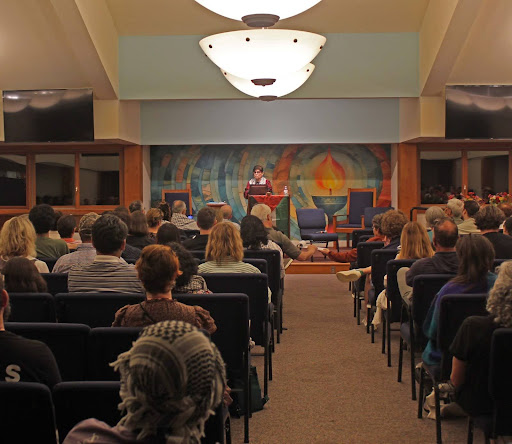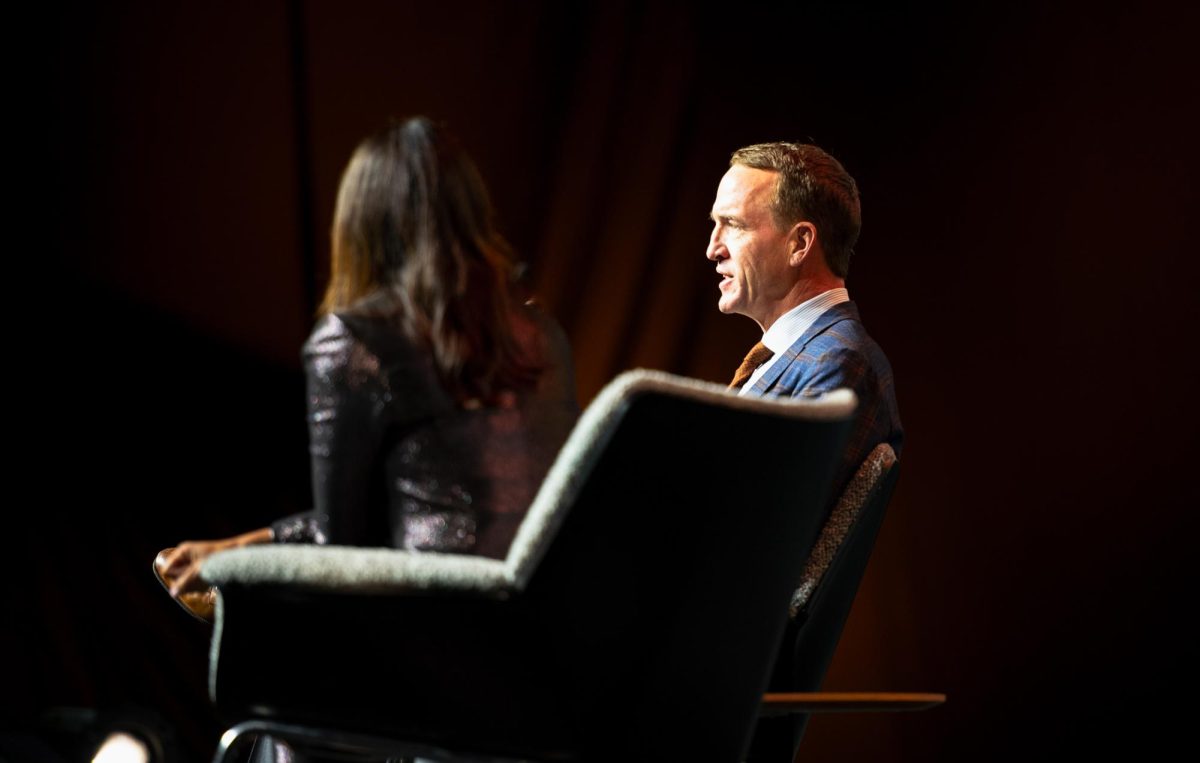On Friday, Feb. 1 at 6 p.m., the altar of Wait Chapel was transformed into a Broadway stage as Hamilton star Renée Elise Goldsberry captivated the Wake Forest community during her interview and performance of three songs.
Goldsberry’s keynote interview and performance commenced the international conference on “The Arts of Leading: Perspectives from the Humanities and Liberal Arts,” which was organized through the collaborative efforts of Wake Forest University and the Oxford Character Project.
Michael Lamb, the director of the program for Leadership and Character, opened with remarks upon the conference’s aims.
“[The goal] is to catalyze the international conversation that informs how we lead while drawing on lessons from the humanities and the arts … [and] to promote a more inclusive and creative vision of leadership,” said Lamb.
Goldsberry has received a Tony Award, Grammy Award, Drama Desk Award and Lucille Lortel Award for her performance as Angelica Schuyler in the musical Hamilton, and she has since starred in other title roles like Henrietta Lacks in The Immortal Life of Henrietta Lacks.
The conference began with a moderated question and answer session between Goldsberry and Derek Hicks, who is an associate professor of Religion and Culture in the Wake Forest School of Divinity, and a close friend of Goldsberry.
The conversation emanated a sense of intimacy through Goldsberry’s inclusion of personal anecdotes and the sense that leadership, like her keynote interview, is a collaborative and inclusive conversation of inspiring others.
Goldsberry initially described her upbringing in a predominantly scientifically-oriented family, where she, the sole musician, found inspiration in the music that was constantly playing in her household and her father’s embrace of a diverse range of music genres.
Furthermore, Goldsberry explained that her work as a musician coincides with her childhood comprehension of “loving and being able to ingest all kinds of music.” This valuable aspect of her formative experience as a musician led her to the creative genius of Lin-Manuel Miranda, who she described as a “walking playlist” when she worked with him during the production of the Broadway musical, Hamilton.
She also explained how her role as a musician began when she fell in love with music at Houston International Music School. She subsequently embarked upon what she called “a career of first,” including notable experiences like her first show, first play, acceptance to Carnegie Mellon University and first job.
Although these first experiences each had their individual significances, Goldsberry could not identify a specific moment in her acting career when she “blew up,” or had a spectacular breakthrough that was the pinnacle of her career. Instead, she humbly identified lesser-known roles as those which shaped her character and continue to motivate her to improve today, such as her role as Nicole Taylor in All About You, an independent movie that never became a blockbuster, and her role in soap operas like “One Life to Live.”
These roles fostered her acting skills and character, even though she was not in the midst of the spotlight of stardom yet.
“Character is like integrity,” said Goldsberry. “It’s what you do when you don’t think anyone is watching. It’s the part of your identity that you choose.”
To many, she became internationally recognized as a leading actress through her role as Angelica Schuyler in the Broadway musical Hamilton, which had a universal appeal through its unique form of lyricism and popularization of the personal story of Alexander Hamilton, a previously lesser-known Founding Father.
In addition to her own experiences as an actress, she finds inspiration in notable female leaders like Sarah Vons and Oprah Winfrey, as well as her family.
“I am influenced more by people who are not famous than by people who are,” said Goldsberry. “If you have an example in your home of someone who has great character and integrity, there’s a good chance you will sway that way.”
Expounding upon her discussion of character, she also depicted the emotional strength a leader requires in order to overcome inevitable and unavoidable failures. First, she dispelled the myth that acting phenoms like her are able to land countless auditions.
“Ninety-four, 95, 96 percent of auditions result in failure,” said Goldsberry. “The definition of success can’t be ‘you picked me.’ You have to show up.”
Then, she furthered the importance of perseverance in the face of adversity when she shared a personal story about learning to accept the loss of her child. Her experience during this time of heightened vulnerability inspired other women who were struggling with similar difficulties.
“The value of failures, aside from being transparent, is knowing that is when we are most valuable,” said Goldsberry.
Her experience with this emotional trauma allowed her to become a resource and inspirational light for others facing comparable obstacles.
As an African-American and female actress, Goldsberry also has overcome obstacles like preconceived notions of what a leader should look like and societal barriers in order to achieve success in the professional acting industry.
In both her roles as Angelica Schuyler in Hamilton and Henrietta Lacks in The Immortal Life of Henrietta Lacks, Goldsberry depicts a more inclusive vision of history in which women and African-Americans have an active role in shaping the world around them.
“What we do is wonderful, but on the scale of the kind of profession that is really a benefit to mankind, I think that there are other professions that give more,” said Goldsberry. “But, when you get to play a role like Angelica Schuyler or Henrietta Lacks and you get to introduce people to history or people that come before us, it elevates our profession to those on the front lines.”
She also discussed how her role as Angelica Schuyler impacted her perspective on the role of women in history and allowed her to recognize the inherent strength of women.
“It’s exciting to recognize how powerful we were as women in every age and every crisis,” she said. “Before we had a hashtag, women were powerful and influential before they could even vote. They were able to see opportunity and not just barriers … I know the challenge before me, but I also feel empowered.”
Her clarion call for celebrating and embracing diversity in modern society is visible in both her work as an actress and a musician, as she equally excels in and demonstrates character and leadership through both forms of performing arts.
“My artistry is about entertaining,” she said. “And at the moment, what my art is doing is reminding us how much we have in common with each other.”
To conclude, Goldsberry exhibited her artistic focus on inclusion through the following performance of three songs with soulful music, improvisation and audience participation.
As a final expression of the importance of persevering toward a more inclusive vision of leadership and a more welcoming embrace of diversity in the world today, Goldsberry requested the audience to unite in choral harmony with her.
“We’re too strong not to keep on keeping on,” sang Goldsberry and the audience.
Finally, she concluded with a performance of “Satisfied,” which elicited more audience participation as the Hamilton enthusiasts in the audience joined her in singing. In an interview, Goldsberry verified that “Satisfied” is, in fact, her favorite song to perform in Hamilton.
Thus, with harmonious unity, the international conference on “The Arts of Leading” commenced as the last note of “Satisfied” resonated, and thunderous applause erupted throughout the auditorium of Wait Chapel.
Opening with Goldsberry’s interview and performance, “The Arts of Leading: Perspectives from the Humanities and Liberal Arts” conference continued Feb. 2 through 3 as a series of speeches and interactive workshops held in the Porter B. Byrum Welcome Center.
Wake Forest President Nathan O. Hatch commented on the value of the “Arts of Leading Conference” to the Wake Forest community as an opportunity to learn from leading perspectives in the arts like Goldsberry’s stories and performances exhibiting character and leadership.
“Wake Forest is committed to nurturing future leaders who exhibit intellect and character,” said Hatch.


